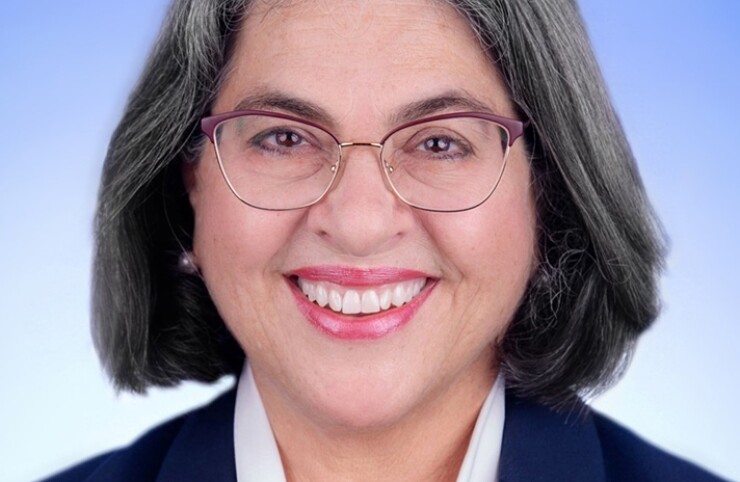Miami-Dade County mayor proposes $12B budget with 1% property tax cut
4 min read

Miami-Dade County Mayor Daniella Levine Cava presented her proposed $11.7 billion fiscal 2023-2024 budget, featuring tax cuts, on Monday.
“With this year’s budget, we’re creating a more future-ready Miami-Dade — building for today and investing in tomorrow,” Levine Cava said.
The $11.69 billion budget includes a 1% property tax cut and a gas tax holiday, which the mayor said totals over $36 million in savings for residents.
The proposed budget and capital plan are broken down into an operating budget of about $7.28 billion and a capital plan of around $4.41 billion. Property taxes make up about 36% of funding for the operating budget.
Last July, the Miami-Dade Board of County Commissioners approved the mayor’s proposal to lower the property tax by 1%, the first cut in over 10 years. The board cut the countywide, unincorporated municipal service area, library and fire levies, bringing the combined millage rates to their lowest levels since 1982-1983.
The proposed capital budget is supported by debt issuance backed by proprietary revenues, such as water and wastewater charges and the fees at the airports and seaport, according to the budget proposal. There are also programs funded by impact fees, grants and debt backed by non-ad valorem revenues, such as tourist taxes and sales and utility taxes.
General obligation bonds payable from ad valorem revenues approved by referendum support projects of the Building Better Communities GO bond program and the Jackson Miracle bond program. A separate millage rate is charged to pay the annual debt service to support those programs, according to the proposal.
“While we have estimated the debt service payments necessary to support these issuances, the financial markets are very unpredictable, so final amounts for these adopted transactions will be determined when the authorizing legislation is presented to the Board of County Commissioners for approval at the time the transactions are priced in the market,” the budget states.
Since 2013, the county has sold about $19 billion of debt, with the most issuance occurring in 2020 when it offered about $2.9 billion. The county’s GOs are rated Aa2 by Moody’s Investors Service and AA by S&P Global Ratings and Fitch Ratings. All three maintain a stable outlook on the credit.
The seaport operates the Dante B. Fascell Port of Miami-Dade County while the Aviation Department operates and develops the activities of Miami International Airport, three other general aviation airports and one training airport.
PortMiami is looking at issuance of about $856 million in the next fiscal year, according to the budget statement. The port also has a $200 million commercial paper program available and is working on the next round of funding for its capital projects.
“The port, along with the county, successfully refinanced $534.8 million in outstanding debt [last year]. The Series 2022 bonds were oversubscribed, with demand exceeding supply about seven times with over $3 billion in received orders,” the budget states.
“With coupon rates ranging from 5.00% to 5.25% and excellent demand, a premium of $39.9 million was generated resulting in a true interest cost of 4.57%. The premium generated funds issuance costs and bond reserve accounts without requiring the seaport to fund unrestricted reserves for these obligations,” according to the budget.
The $1.24 billion Miami-Dade County offering of seaport revenue refunding bonds for PortMiami was the winner of The Bond Buyer’s Deal Of The Year Award in 2021. The financing was the largest port transaction to come to market in the country since the start of the COVID-19 pandemic and the high demand for the bonds highlighted investor confidence in the seaport sector.
The Aviation Department is looking at issuance of about $358 million in the next fiscal year. The department’s five- to 15-year capital improvement plan totals $6.917 billion and will fund several programs.
Miami International Airport ranks first in the United States for international passenger traffic and maintains one of the highest international-to-domestic passenger ratios of any
airport in the country.
This is the third budget of her administration and Levine Cava again focuses on investment in housing, small businesses, the environment and infrastructure projects.
The proposed budget includes allocations from the $121 million planned for infrastructure projects with $13.1 million allocated to specific projects while the remaining funding of $107.9 million would be set aside for septic to sewer, infrastructure and resiliency projects.
Several one-time allocations totaling $50.225 million for future infrastructure projects were also included, such as a $17.3 million transfer to the general fund for municipal infrastructure project payments, $13 million for commission district designated projects, a $7.7 million local match for committed resiliency grants and a $6.7 million transfer to the general government improvement fund for infrastructure projects.
In the area of housing, the administration wants to expand the inventory of workforce and affordable housing and providing relief to renters and homeowners. The city is also growing its Office of Housing Advocacy, to connect more residents to critical services.
Levine Cava also focused on environmental issues and how they affect the county’s economic health.
“This year’s budget will include funding to protect our bay and to tackle major climate threats, by accelerating septic to sewer conversion projects, preventing flooding by investing in stormwater infrastructure … and protecting residents and visitors from extreme heat,” she said.
As of Tuesday, Miami-Dade County has seen 37 consecutive days with a heat index above 100.
For small business, the mayor is proposing community development block grants, which encourage economic development, minority-owned small business grants that support local entrepreneurs and completion of a procurement disparity study to even the playing field for small and local businesses.
To help families, the county will partner with Miami-Dade College to make obtaining an associate degree free for more eligible families and will expand child daycare programs.
“We have proposed a budget that is smart, compassionate, and puts people first,” Levine Cava said. “It builds on last year’s historic tax cut while continuing to make key investments in our community’s core priorities.”







